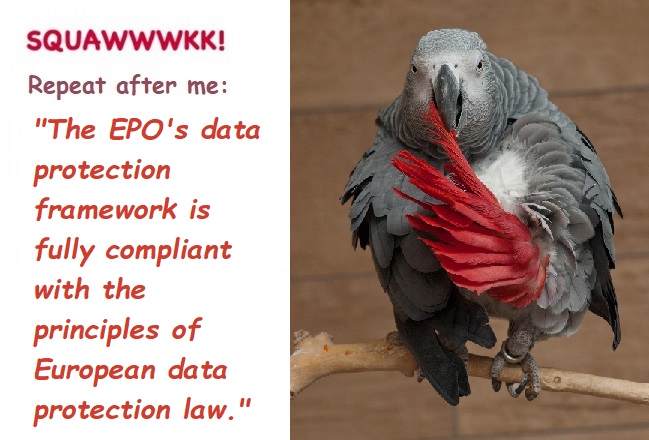

What could possibly have led the German government to parrot the EPO's bogus and self-serving claims about GDPR-compliance?
Back in October 2019, the FDP submitted another "minor interpellation" entitled "Data protection in relation to cooperation with the EPO" ("Datenschutz bei EPA-Zusammenarbeit" - Bundestag Printed Paper [PDF] no. 19/14490).
"This interpellation contained a series of questions relating to the EPO's data protection framework, in particular in the context of data exchanges with national authorities such as the German Patent & Trademark Office."Under point 7. of the interpellation, the FDP explicitly raised the issue of the compliance of the EPO's data protection framework with the GDPR (which had entered into force over a year previously in May 2018).
The relevant passage of the interpellation reads as follows (in translation):
According to the knowledge of the Federal Government, is data processing at the EPO compliant with the provisions of the GDPR, or does it have any indications that would suggest a deviation from GDPR regulations?
[PDF] no. 19/15072).
The passage of the response which addresses point 7. of the FDP's interpellation reads as follows (in translation):
The Federal Government has no indication that the EPO does not comply with the provisions of the European data protection standards. The Board of Auditors of the European Patent Organisation, which is appointed by the Administrative Council under Article 49(1) EPC and carries out its activities in accordance with Articles 49 and 50 EPC and its Rules of Procedure and professional auditing standards, stated the following in its audit report for the financial year 2018 (document CA/20/19) (warning:epo.orglink). Although the EPO, as an international organization, is not directly subject to EU rules, the basic principles of the GDPR have nevertheless been implemented, as data of European citizens are processed at the EPO. In addition, it was noted that for the sake of transparency, the EPO has already established a data protection register in the past to record all processing of personal data. Upon request, the information can be made available (publicly) to the data subject, thus ensuring the right to information.
"It seems that the reader is supposed to accept these assertions on "blind faith"."What is particularly noteworthy is the fact that the German government appears to rely solely on the EPO's internal audit report for the financial year 2018 (CA/20/19) (warning: epo.org link) as the basis for its "considered opinion" that the EPO's data protection framework is GDPR-compliant.
There's just one small problem here.
Neither CA/20/19 nor any other internal "audit report" from the EPO contains a meaningful substantive assessment of the organisation's data protection framework and its purported compliance with GDPR standards.
The available audit reports from the EPO (CA/20/18, CA/20/19, CA/20/20) (warning: all are epo.org links) only contain cursory self-serving assertions to the effect that the organisation's data protection framework is "relatively closely aligned" with EU data processing regulations - whatever that is supposed to mean.
What is conspicuously absent is a credible independent audit of the EPO's data protection framework that could be considered to substantiate the self-serving assertions emanating from the EPO's senior management.
It seems that the reader is supposed to accept these assertions on "blind faith".
"For this reason it's a bit disconcerting to see the Federal Government of Germany still parroting the EPO's manifestly bogus and self-serving assertions about GDPR-compliance in such a naïve and uncritical manner in November 2019."However, this becomes difficult when it is recalled that back in 2016 the EPO staff union (SUEPO) commissioned a report about various aspects of EPO governance from external legal experts.
This report dated 31 May 2016 - which is publicly available - found that the EPO's data protection framework was not compliant with EU data protection standards and that it was in urgent need of a radical overhaul.
Nothing of substance has changed since May 2016.
For this reason it's a bit disconcerting to see the Federal Government of Germany still parroting the EPO's manifestly bogus and self-serving assertions about GDPR-compliance in such a naïve and uncritical manner in November 2019.
In the next part we will consider how this curious state of affairs came about. ⬆